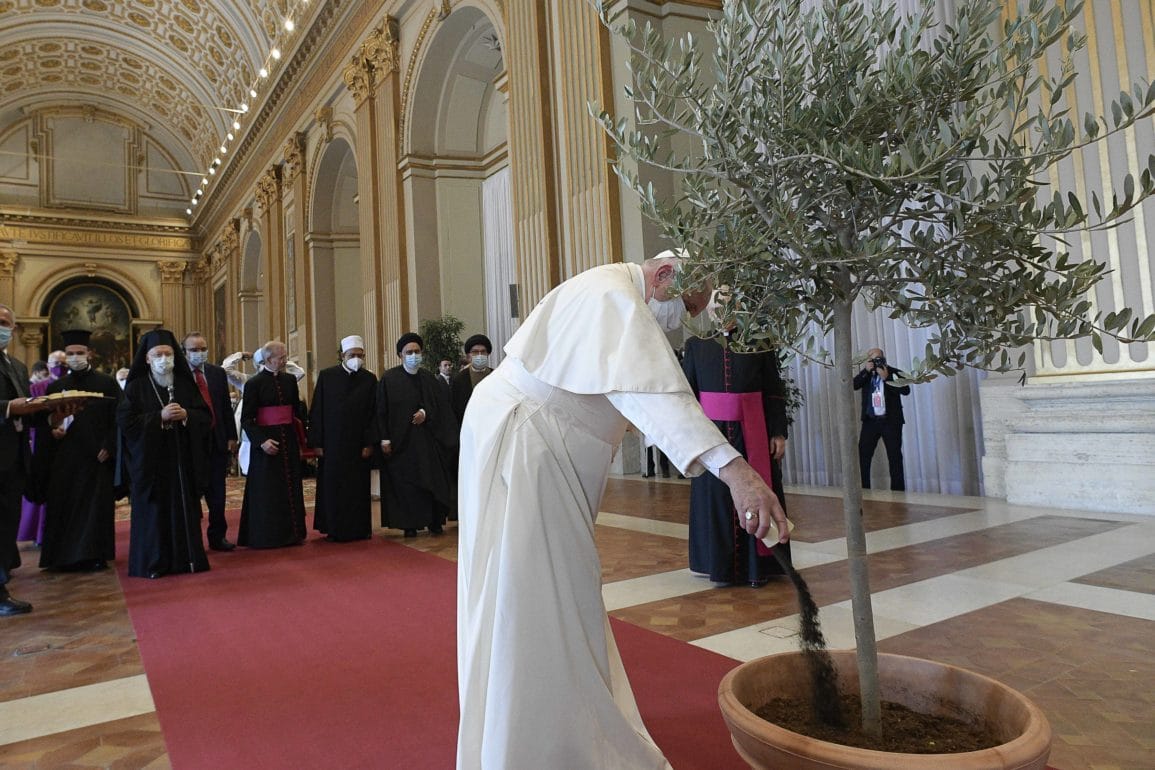Today, Monday, October 18, 2021, Mexican Father Mario Arroyo Martinez shares with Exaudi’s readers his article in “Theology for Millennials” entitled “Religions and Climate Change,” on the recent meeting in the Vatican, in which the Pope gathered some 40 religious leaders to express their support of Glasgow’s COP26 and their concern over climate change.
* * *
On three occasions (1986, 1993, and 2002) Saint John Paul II brought together the world’s religious leaders to pray for peace in Assisi. Thus he wished to show how religion, in general, can be a force for peace, generate peace around it, and not violence, as happens sometimes (in 2002 the attack on the Twin Towers, perpetrated by Islamic fundamentalists, was very recent). Atheist criticism usually points out that religion is a cause of division in the world, perhaps the most profound, therefore, it’s a moral duty to attack it. The holy Pope met that tendentious criticism and showed how religious leaders can obviate their differences, dialogue, and unite to pray for peace.
Now, in 2021, humanity, along with the need for peace, which can never be taken for granted, has the urgency to take care of the planet. Can religions unite to pray for the planet’s health and to address climate change? What Saint John Paul II did for peace, Pope Francis is now doing for climate change: The Holy Father gathered some 40 religious leaders in the Vatican to express their support for Glasgow’s COP26 and their concern over climate change. All signed an appeal to halt climate change. Among the participants were the Archbishop of Canterbury, the Ecumenical Patriarch Bartholomew, and the Grand Imam of Al-Azhar — religions united to address contamination and to defend the planet’s health.
Along with representatives of different Christian Confessions, were Jewish, Muslim, Hindu, Buddhist, Sikh, Confucianist, Taoist and Zoroastrian leaders, namely, leaders of the most representative religions of the planet. All expressed their common concern about the climate and ecology. This reality shows how religions have points in common, despite their historical and cultural differences, and that those common points converge in the benefit of humanity. Thus climate change also contributes to unity between the different creeds, as it shows how all can work together for man and society. Doctrinal differences are not an obstacle to be able to do good together, in a team.
Pope Francis didn’t read his address, in order not to extend the ceremony too much and to allow others to express themselves. He did, however, hand them his written intervention. Faithful to his usual scheme of thought, in it, he stresses three points: “the gaze of inter-dependence and sharing, the engine of love, and vocation to respect.” Faithful to his fundamental intuitions, Pope Francis highlights that “everything is connected,” hence, we must have an open gaze on interdependence and share.” We are all members of the one human family, and we share the responsibility to have it get ahead.
The “engine of love” is what leads us to face the “throwaway culture,” inviting us to generate a culture “of care for our common home.” It is love that makes us face “the seeds of conflict: greed, indifference, ignorance, fear, injustice, insecurity, and violence.” These seeds weaken the “alliance between the human being and the environment, which must be the reflection of God’s creative love.” To generate a culture of “care for our common home,” the Pope suggests two solutions that religions can contribute: “example and action,” and “education.” Each one from his Creed and cultural tradition can make his contribution to these ambits to take care of the planet.
The third element Pope Francis pointed out is “respect for creation, respect for one’s neighbor, respect for oneself and respect to the Creator; but also mutual respect between faith and science so that the fruitful dialogue between them is oriented to the “care of nature, the defense of the poor, and the building of networks of respect and fraternity.” As can be seen, the Pontiff is ambitious in his perspective. He thinks religion can contribute a lot to science and how, together, they can contribute to halting climate change. In the Christian realm, this care is part of Catholic spirituality.
Translation by Virginia M. Forrester










